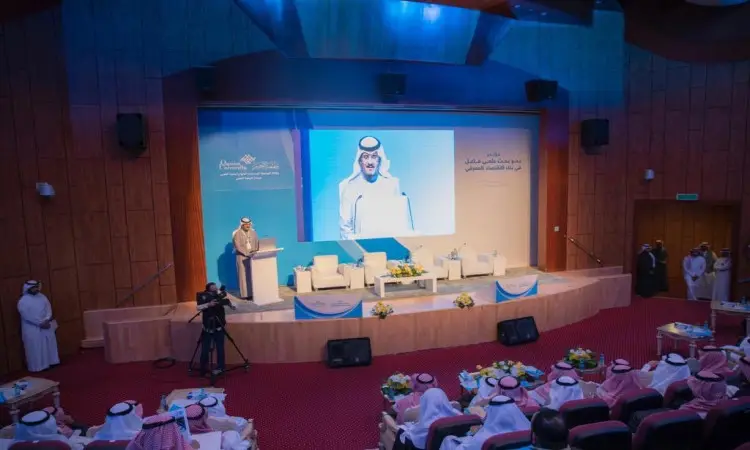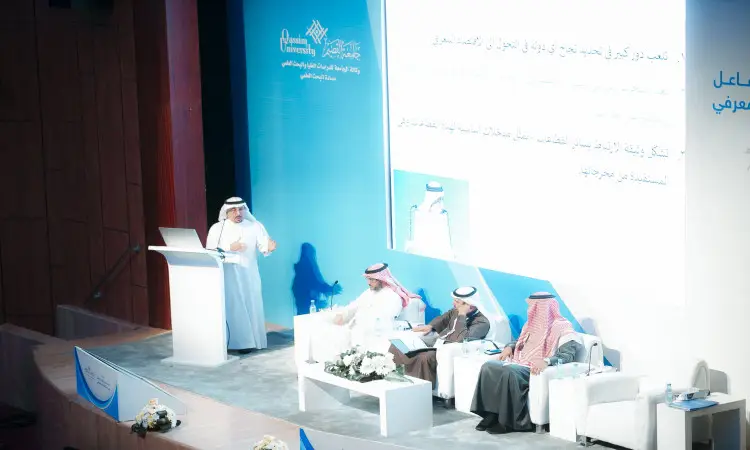His Excellency Prof. Dr. Abdulrahman bin Hamad Al-Dawood, President of the University of Saudi Arabia, affirmed that universities in the Kingdom of Saudi Arabia are mandated to provide everything that develops the aspect of the knowledge economy, which is the main pillar for increasing production and development, especially in light of the great support that universities receive from the wise leadership by the Custodian of the Two Holy Mosques and His Highness the Crown Prince - may Allah protect them -.
During his patronage of the "Towards Effective Scientific Research in Building the Knowledge Economy" conference, which kicked off on Wednesday at Al-Malidah University City and continues until tomorrow, Thursday, with the participation of 13 specialists from various universities and research centers from inside and outside the Kingdom, Al-Dawood added that universities are the focus of discussing such topics, pointing out the importance of students specializing in various graduate programs to understand the importance of their role in developing, promoting and the future of scientific research in our country.
Al-Dawood also stressed that holding this conference at Qassim University comes out of the keenness of the University Vice Presidency for Studies and Scientific Research and the specialists in the university's colleges and research centers to activate this axis stipulated by the Kingdom's vision, and to activate this term of the knowledge economy not only by talking, meetings and conferences, but we must also take these research and experiences from universities to the production stage, and then the development and encouragement stage.
Al-Dawood added that the university will not stop at holding this conference, but will be followed by conferences and events, until we celebrate, God willing, the increase and diversity of production that we all seek at the level of universities, especially since the country needs to discuss, activate and develop this matter. He thanked everyone who attended, participated and worked to make this conference successful, and for the interest in this topic, stressing that the university will continue these efforts, God willing, until we reach advanced stages of scientific research to compete with those who preceded us in this field, stressing the importance of students' attendance, especially graduate students for such seminars and conferences, which will reflect positively on their performance and reflect on the nation as a whole.
For his part, Dr. Ahmed Al-Turki, UQU Vice President for Postgraduate Studies and Scientific Research and Chairman of the Conference Organizing Committee, stressed that it is no secret that directed scientific research is the foundation on which the knowledge economy is built, and it is the one that transforms knowledge into products of economic value that may exceed the value of natural resources, and therefore it was necessary for universities and research centers in the Kingdom of Saudi Arabia to seek to direct scientific research priorities into applied research that ends with products that can be developed and then marketed to contribute to building a knowledge-based economy, which is one of the basic aspirations emphasized more than once by the vision of the Kingdom of Saudi Arabia.
Al-Turki explained that one of the most prominent examples based on the knowledge economy in the world is the work of Apple, which made from cheap raw materials such as glass, plastic and copper smartphones that are sold for thousands of dollars, as the income of this company exceeded the world's companies in the fields of oil, gas, cars and real estate, indicating that from this perspective and in order to achieve this vision, the university wished to organize this conference to benefit from these experiences and direct practical research in universities towards a knowledge economy, and to identify the obstacles and challenges to practical research towards transformation into marketable products.
He added that the conference also aims to identify the obstacles and challenges in this field and to activate the opportunities that contribute to building the knowledge economy, and to benefit from successful experiences in the Arab and international world in this field. The conference included various themes, the most important of which are the requirements of the knowledge economy, obstacles, challenges, areas and opportunities, in addition to successful practices and bright experiences, and the conference was approved by 13 researchers who have experience, expertise and scientific research in the field of the conference from some Saudi universities.
Dr. Mohammed bin Abdullah Al Abbas, a member of the Shura Council, delivered the participants' speech in which he stressed that the science of economics is still full of secrets, renewed ideas and many challenges, quoting a quote from an international economic writer: "The economy as we know it today would not exist if economic predictions were correct, but the economy as we know it today has come as a result of the mistakes of economists more than their correct predictions." He pointed out that the huge economic events that passed during the past centuries could not be accurately predicted and in many cases could not be theorized, and yet many of the economic facts as we see them today have come as a result of them.
Al Abbas said that the world is going through the fourth industrial revolution, which is the stage that witnesses the penetration of technology into all human life, in which robotics, artificial intelligence, nanotechnology, and 3D printing appear to lead us towards major changes in production and management systems, and yet this huge breakthrough has hardly been theorized and its effects on societies, noting that our Vision 2030 shows the main interest in making a strategic qualitative leap in line with this technological era, pointing out that the annual speech of the Custodian of the Two Holy Mosques King Salman bin Abdulaziz - may God protect him - which he delivered
"Al Abbas" stressed the importance of effective investment in human capital, and the realization that developing and investing in human capital requires many measures to enhance the status of science and scientific research, as investing in knowledge in general is a bigger issue than investing in human capital, indicating that this was emphasized by the Saudi Minister of Finance in his meeting with the International Transport Fund when he stressed the importance of capacity building that leads to building advanced technologies by governments and individuals in general, and addressed the importance of technology in promoting financial inclusion globally, while stressing the importance of utilizing this tool to promote economic growth and develop markets.




